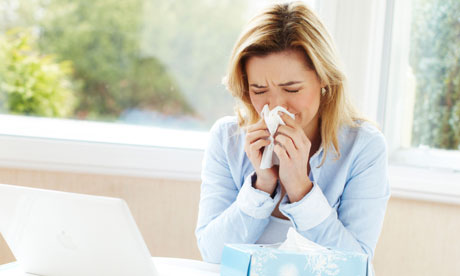
If you get hay fever, you'll know when the pollen season is here. Tree pollen is already upon us; the grass pollen season kicks in at the end of May and can last until September. But do you wait for your eyes and throat to itch, your nose to feel blocked up and run at the same time, and your head to ache before heading to the chemist? Some treatments take longer than a day to work, but is it worth the hassle and cost of treating yourself before you start sneezing uncontrollably?
The solution
Hay fever is caused by an allergy to pollen. Your immune system thinks it has met a harmful agent, overreacts and produces immunoglobulins (called IgE) that release the chemicals (for example histamine) that make your nose, throat and eyes inflamed. This means your eyes itch and your nose runs.
Nasal steroids stop your nose streaming, but need to be started two weeks before symptoms begin, preventing rather than curing symptoms. They work by stabilising the mast cells that immunoglobulins interact with to release the chemicals that cause hay fever symptoms. Ideally, you would remember when your hay fever started last year and begin spraying your nose a fortnight earlier. Nasal sprays also relieve itchy eyes, but they can sting and make your nose bleed (if this happens, stop and ask your doctor if you should continue), and some people just don't like spraying their noses every day.
Antihistamines can reduce sneezing and a runny nose; cromoglicate eyedrops can help itchy eyes. They don't need to be started early, but neither is as effective as nasal steroid sprays.
Immunotherapy treatments are sometimes used for severe hay fever. They change how your immune system responds to pollen by overwhelming it with a standardised larger dose of pollen than it would normally get. This mutes the immune system and reduces symptoms. The bad news? Immunotherapy is time consuming, costly and not readily available. It also carries a small risk of anaphylaxis, an overwhelming immune response to the pollen that can cause death. Immunotherapy is given as injections or tablets and should be started three to four months before the hay fever season. The injections are weekly for seven to 10 weeks for three years. The tablet (Grazax) goes under your tongue every day for three years. If you only have hay fever for three months of the year that can seem a huge commitment. The Drug and Therapeutics Bulletin says Grazax "moderately" improves symptoms.
So if you want to avoid hay fever, you need to plan ahead. But you should also avoid pollen by not exercising outdoors in the morning and keeping windows closed.

